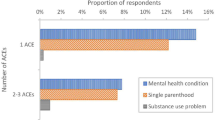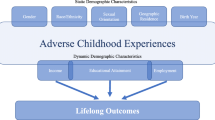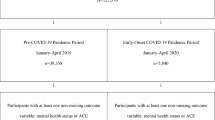Abstract
Purpose
Our study assesses the relationships between self-reported adverse childhood experiences (ACEs) (including sexual, physical, or verbal abuse, along with household dysfunction including parental separation or divorce, domestic violence, mental illness, substance abuse, or incarcerated household member) and unemployment status in five US states in 2009.
Methods
We examined these relationships using the 2009 Behavioral Risk Factor Surveillance System survey data from 17,469 respondents (aged 18–64 years) who resided in five states, completed the ACE Questionnaire, and provided socio-demographic and social support information. We also assessed the mediation of these relationships by respondents’ educational attainment, marital status, and social support.
Results
About two-third of respondents reported having had at least one ACEs, while 15.1 % of men and 19.3 % of women reported having had ≥4 ACEs. Among both men and women, the unemployment rate in 2009 was significantly higher among those who reported having had any ACE than among those who reported no ACEs (p < 0.05). Educational attainment, marital status, and social support mediated the relationship between ACEs and unemployment, particularly among women.
Conclusions
ACEs appear to be associated with increased risk for unemployment among men and women. Further studies may be needed to better understand how education, marital status, and social support mediate the association between multiple ACEs and unemployment.



Similar content being viewed by others
References
Centers for Disease Control and Prevention (2010) Adverse childhood experiences reported by adults-five states, 2009. Morbi and Mortal Wkly Rep 59:1609–1613
Dong M, Anda RF, Felitti VJ et al (2004) The interrelatedness of multiple forms of childhood abuse, neglect, and household dysfunction. Child Abuse Negl 28:771–784
Hillis SD, Anda RF, Felitti VJ et al (2000) Adverse childhood experiences and sexually transmitted diseases in men and women: a retrospective study. Pediatrics 106:E11
Felitti VJ, Anda RF, Nordenberg D et al (1998) Relationship of childhood abuse and household dysfunction to many of the leading causes of death in adults. The adverse childhood experiences study. Am J Prev Med 14:245–258
Dong M, Dube SR, Felitti VJ et al (2003) Adverse childhood experiences and self-reported liver disease: new insights into the causal pathway. Arch Intern Med 163:1949–1956
Dong M, Giles WH, Felitti VJ et al (2004) Insights into causal pathways for ischemic heart disease: adverse childhood experiences study. Circulation 110:1761–1766
Anda RF, Brown DW, Dube SR et al (2008) Adverse childhood experiences and chronic obstructive pulmonary disease in adults. Am J Prev Med 34:396–403
Brown DW, Anda RF, Tiemeier H et al (2009) Adverse childhood experiences and the risk of premature mortality. Am J Prev Med 37:389–396
Dube SR, Fairweather D, Pearson WS et al (2009) Cumulative childhood stress and autoimmune diseases in adults. Psychosom Med 71:243–250
Brown DW, Anda RF, Felitti VJ et al (2010) Adverse childhood experiences are associated with the risk of lung cancer: a prospective cohort. BMC Public Health 10:20
Dube SR, Felitti VJ, Dong M et al (2003) Childhood abuse, neglect, and household dysfunction and the risk of illicit drug use: the adverse childhood experiences study. Pediatrics 111:564–572
Bensley LS, Spieker SJ, Van Eenwyk J et al (1999) Self-reported abuse history and adolescent problem behaviors. II. Alcohol and drug use. J Adolesc Health 24:173–180
Ramiro LS, Madrid BJ, Brown DW (2010) Adverse childhood experiences (ACE) and health-risk behaviors among adults in a developing country setting. Child Abuse Negl 34:842–855
Topitzes J, Mersky JP, Reynolds AJ (2010) Child maltreatment and adult cigarette smoking: a long-term developmental model. J Pediatr Psychol 35:484–498
Chapman DP, Whitfield CL, Felitti VJ et al (2004) Adverse childhood experiences and the risk of depressive disorders in adulthood. J Affect Disord 82:217–225
Hillis SD, Anda RF, Dube SR et al (2004) The association between adverse childhood experiences and adolescent pregnancy, long-term psychosocial consequences, and fetal death. Pediatrics 113:320–327
Anda RF, Felitti VJ, Bremner JD et al (2006) The enduring effects of abuse and related experiences in childhood: a convergence of evidence from neurobiology and epidemiology. Euro Arch Psychiatry Clin Neurosci 256:174–186
Brown DW, Anda RF, Edwards VJ et al (2007) Adverse childhood experiences and childhood amnesia. Child Abuse Negl 31:961–969
Salzinger S, Rosario M, Feldman RS et al (2007) Adolescent suicidal behavior: associations with preadolescent physical abuse and selected risk and protective factors. J Am Acad Child Adolesc Psychiatry 46:859–866
Rohde P, Ichikawa L, Simon GE et al (2008) Associations of child sexual and physical abuse with obesity and depression in middle-aged women. Child Abuse Negl 32:878–887
Dube SR, Anda RF, Felitti VJ et al (2001) Childhood abuse, household dysfunction, and the risk of attempted suicide throughout the life span: findings from the adverse childhood experiences study. JAMA 286:3089–3096
Pollack VE, Briere J, Schneider L et al (1990) Child antecedents of antisocial behavior: parental alcoholism and physical abusiveness. Am J Psychiatry 147:1290–1293
Perez CM, Widom CS (1994) Childhood victimization and long-term intellectual and academic outcomes. Child Abuse Negl 18:617–633
Anda RF, Fleisher VI, Felitti VJ et al (2004) Childhood abuse, household dysfunction, and indicators of impaired adult worker performance. Perm J 8:30–38
Boden JM, Horwood LJ, Fergusson DM (2007) Exposure to childhood sexual and physical abuse and subsequent educational achievement outcomes. Child Abuse Negl 31:1101–1114
Harkonmäki K, Korkeila K, Vahtera J et al (2007) Childhood adversities as a predictor of disability retirement. J Epidemiol Commun Health 61:479–484
Currie J, Widom CS (2010) Long-term consequences of child abuse and neglect on adult economic well-being. Child Maltreat 15:111–120
Zielinski DS (2009) Child maltreatment and adult socioeconomic well-being. Child Abuse Negl 33:666–678
Macmillan R (2000) Adolescent victimization and income deficits in adulthood: rethinking the costs of criminal violence from a life-course perspective. Criminology 38:553–588
Macmillan R, Hagan J (2004) Violence in the transition to adulthood: adolescent victimization, education, and socioeconomic attainment in later life. J Res on Adolesc 14:127–158
Finkelhor D, Hotaling GT, Lewis IA et al (1989) Sexual abuse and its relationship to later sexual satisfaction, marital status, religion, and attitudes. J Interpers Violence 4:379–399
Whisman MA (2006) Childhood trauma and marital outcomes in adulthood. Pers Relationships 13:375–386
Behavioral Risk Factor Surveillance System (2006) Operational and User’s guide Report, Version 3.0, 12/12/2006, CDC (ftp://ftp.cdc.gov/pub/Data/Brfss/userguide.pdf). (Accessed January 11, 2011)
Behavioral Risk Factor Surveillance System (2009) Summary Data Quality Report, Version 1, revised 04/27/2010, CDC (ftp://ftp.cdc.gov/pub/Data/Brfss/2009_Summary_Data_Quality_Report.pdf). Accessed 11 January 2011
Jasti S, Dudley WN, Goldwater E (2008) SAS Macros for testing statistical mediation in data with binary mediators or outcomes. Nurs Res 57:118–122
MacKinnon DP, Dwyer JH (1993) Estimating mediated effects in prevention studies. Eval Rev 17:144–158
Baron RM, Kenny DA (1986) The moderator-mediator variable distinction in social psychological research: conceptual, strategic, and statistical considerations. J Pers Soc Psychol 51:1173–1182
Research Triangle Institute (2008) SUDAAN, release 10.0. Research Triangle Park, NC
Fang X, Brown DS, Florence CS et al (2012) The economic burden of child maltreatment in the United States and implications for prevention. Child Abuse Negl 36:156–165
Martin JA, Elmer E (1992) Battered children grown up: a follow-up study of individuals severely maltreated as children. Child Abuse Negl 16:75–87
Hall JM (2000) Women survivors of children abuse: the impact of traumatic stress on education and work. Issues Ment Health Nurs 21:443–471
Widom CS (1989) Child abuse, neglect and adult behavior: research design and findings on criminality, violence and child abuse. Am J Orthopsychiatry 59:355–367
Jaffee SR, Caspi A, Moffitt TE et al (2007) Individual, family, and neighborhood factors distinguish resilient from non-resilient maltreated children: a cumulative stressors model. Child Abuse Negl 31:231–253
Thoits PA (2010) Stress and health: major findings and policy implications. J Health Soc Behav 511:S41–S53
Umberson D, Montez JK (2010) Social relationships and health: a flashpoint for health policy. J Health Soc Behav 51:S54–S66
Hagan J (1991) Destiny and drift: subcultural preferences, status attainments, and the risk and rewards of youth. Ame Socio Rev 56:567–582
Green JG, McLaughlin K, Berglund PA et al (2010) Childhood adversities and adult psychopathology in the National Comorbidity Survey Replication (NCS-R) I: associations with first onset of DSM-IV disorders. Arch Gen Psychiatry 67:113
McLaughlin KA, Green JG, Gruber MJ et al (2010) Childhood adversities and adult psychopathology in the National Comorbidity Survey Replication (NCS-R) II: associations with persistence of DSM-IV disorders. Arch Gen Psychiatry 67:124–132
Schilling EA, Aseltine RH, Gore S (2008) Details for manuscript number SSM-D-07-00371R2 “The impact of cumulative childhood adversity on young adult mental health: measures, models, and interpretations”. Soc Sci Med 66:1140–1151
Garbarino JA (1976) A preliminary study of some ecological correlates of child abuse: the impact of socioeconomic stress on mothers. Child Dev 47:178–185
Gaudin JM Jr, Pollane I (1983) Social network, stress and child abuse. Child Youth Serv Rev 5:91–102
Sack WH, Mason R, Higgins JE (1985) The single-parent family and abusive child punishment. Am J Orthopsychiatr 55:252–259
Cohen CI, Adler A (1986) Assessing the role of social network intervention with an inter-city population. Am J Orthopsychiatry 56:278–288
Duncan LE, Williams LM (1998) Gender role socialization and male-on-male vs. female-on-male child sexual abuse. Sex Roles 39:765–785
Dhaliwal GK, Gauzas L, Antonowicz DH et al (1996) Adult male survivors of childhood sexual abuse: prevalence, sexual abuse characteristics, and long-term effects. Clin Psychol Rev 16:619–639
Gold SN, Lucenko BA, Elhai JD et al (1999) A comparison of psychological/psychiatric symptomatology of women and men sexually abused as children. Child Abuse Negl 23:683–692
Holmes GR, Offen L, Waller G (1997) See no evil, hear no evil, speak no evil: why do relatively few male victims of childhood sexual abuse receive help for abuse-related issues in adulthood? Clin Psychol Rev 17:69–88
Seagull EA (1987) Social support and child maltreatment: a review of the evidence. Child Abuse Negl 11:41–52
Dong M, Anda RF, Felitti VJ et al (2005) Childhood residential mobility and multiple health risks during adolescence and adulthood: the hidden role of adverse childhood experiences. Arch Pediatr Adolesc Med 159:1104–1111
Acknowledgments
The authors are grateful to all respondents who answered the questionnaire and staff in the department of health from the five states and in CDC who compiled the data. The findings and conclusions in this report are those of the authors and do not necessarily represent the official position of the Centers for Disease Control and Prevention.
Conflict of interest
The authors declare that they have no conflict of interest.
Author information
Authors and Affiliations
Corresponding author
Rights and permissions
About this article
Cite this article
Liu, Y., Croft, J.B., Chapman, D.P. et al. Relationship between adverse childhood experiences and unemployment among adults from five US states. Soc Psychiatry Psychiatr Epidemiol 48, 357–369 (2013). https://doi.org/10.1007/s00127-012-0554-1
Received:
Accepted:
Published:
Issue Date:
DOI: https://doi.org/10.1007/s00127-012-0554-1




